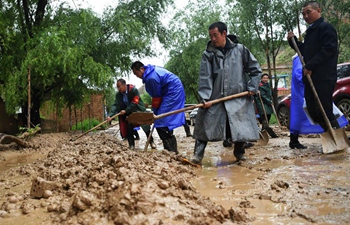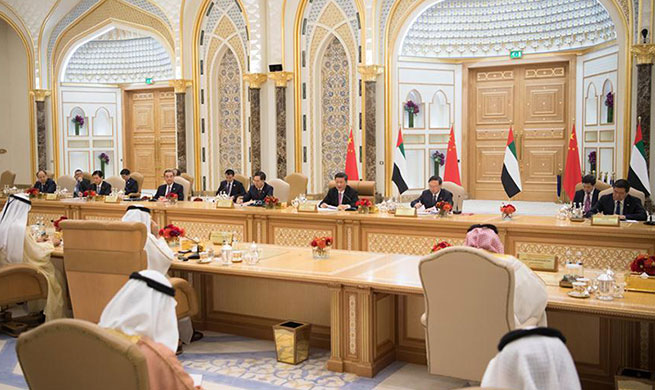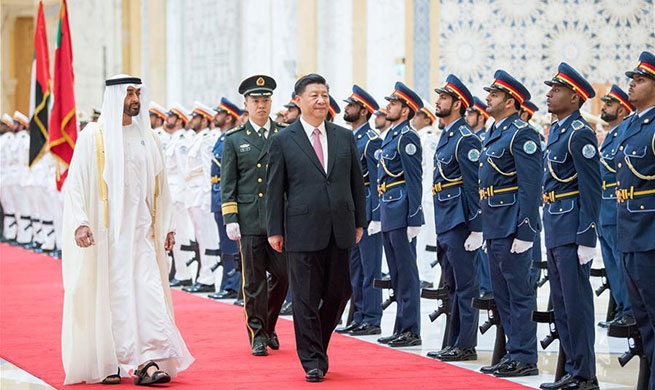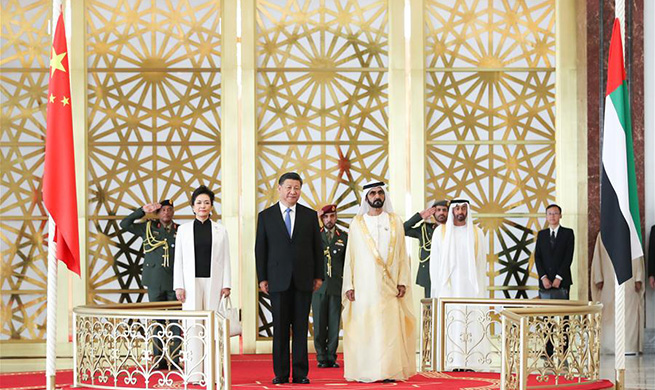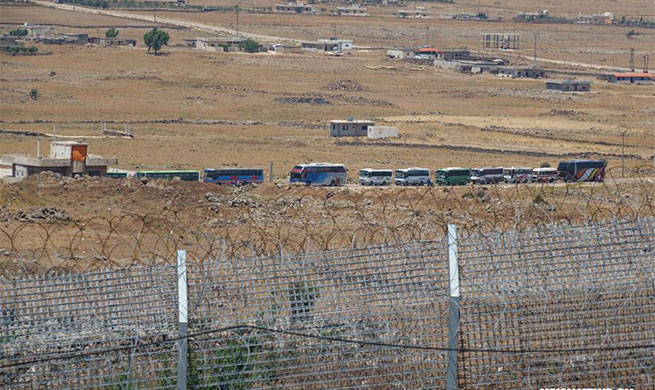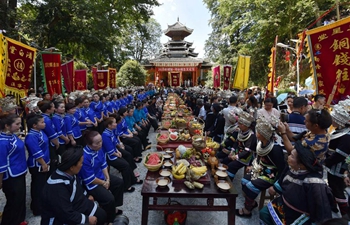by Murad Abdu
ADEN, Yemen, July 20 (Xinhua) -- Yemeni experts believe that the Houthi group is unable to keep control of the strategic port city of Hodeidah for a long time, despite efforts to reinforce through mobilizing hundreds of new tribal fighters from northern provinces.
A field commander of the pro-government Giants Brigades told Xinhua by phone that the Houthi group formed a new force called "the Hussein battalions" as an attempt to confront the pro-government forces in Hodeidah and the Red Sea coast areas.
"We arrested some fighters during the fighting in Hodeidah and after investigations we discovered that they received advanced military trainings under the supervision of foreign experts," the Yemeni field commander revealed anonymously.
"The Houthis recruited hundreds of tribal fighters and joined them with the Hussein battalions and after receiving well training they were brought to Hodeidah to confront the government forces," the source said.
Adeeb Sayed, a political analyst and writer based in southern Yemen, said the Houthis will not surrender peacefully or acknowledge defeat in Hodeidah easily.
"It is clear that the government forces have the upper hand in Hodeidah and the Houthi rebel group is not gaining the battles as it lost many areas and hundreds of its fighters died by Saudi-led airstrikes, but the group's leaders keep disputing that," Adeeb told Xinhua.
"The Houthi group media outlets always talk about victories against foreign forces in Hodeidah just to deceive the northern tribes into thinking the fighting in Red Sea coast areas could still be won," Adeeb said.
Adeeb pointed out that most of the group's high-ranking leaders are not paying enough attention to what they are doing in Hodeidah and also not concerned about losing scores of young fighters in the intensified Saudi-led airstrikes across Yemen everyday.
Earlier this month, the United Arab Emirates (UAE) operating as part of the Saudi-led coalition announced a pause in the military campaign it is leading against the Houthis in Hodeidah to give a chance to UN peace efforts and to achieve an unconditional Houthi withdrawal from the whole city.
A few days ago, the Saudi Arabia-led coalition and the UAE resumed the anti-Houthi military operations in Hodeidah, in which the Yemeni government forces seized full control over Tuhyata district and other surrounding areas.
Many Yemeni analysts concerned that the ongoing fighting and the military escalation in Hodeidah might undermine the upcoming UN-sponsored peace negotiations between the two-warring sides.
Both the Saudi-backed government of President Abd-Rabbu Mansour Hadi and the Houthi leaders had expressed their readiness to return to the negotiating table during their meetings with the UN Special envoy for Yemen Martin Griffiths late in June.
But the Houthis escalated the situation and fired several ballistic missiles against government-controlled areas in Hodeidah and used Iranian-made drones to launch attacks against headquarters of the Saudi-led coalition forces in the southern port city of Aden.
On Thursday, Yemen's Deputy Foreign Minister Mansour Bajash told the official Saba news agency that "the government has announced two cease-fires in order to give the UN initiative and the UN special envoy's efforts the opportunity to achieve results and guarantee the withdrawal of the rebels from the city and the port, but the militants refused to respond to it and turned down the initiative."
Abdul-Raqeeb Hidyani, a political writer and journalist, said the Yemeni government forces are firm to uproot the Houthi militants who received heavy blows in the ongoing fighting raging over the control Hodeidah.
He said that "peace negotiations may be conducted after expelling Houthis from the whole province of Hodeidah because now both the two-warring sides are mobilizing their forces and waiting for the zero hour to begin the real battle."
"The Houthis were pushed out from the government institutions in Hodeidah's district of Tuhyata that has been an important base for the militias and more areas will be liberated in the next few days," Hidyani said.
He believed the recent military victories, including recapturing Tuhyata and other surrounding areas, would build momentum for the government forces to advance toward the center of Hodeidah to expel the Houthi militias.
The strategic military expert Ali Naji Obeid confirmed that the the tough battles between the UAE-backed Yemeni forces and the Houthi fighters in Hodeidah haven't started yet.
Obeid said retaking Hodeidah's strategic seaport from Houthis and ending the presence of the Iranian-backed militias in the country's western part need well-planned massive battles that will be tough at the same time.
"The Houthis will use densely populated areas as military sites for their fighters, making it difficult for UAE-backed forces advance or attack the rebels by artillery or airstrikes," Obeid told Xinhua.
He pointed out that the Saudi Arabia-led coalition might use new military strategies to defeat the Houthi rebel group that is using residential areas as a shield for its fighters in Hodeidah.
Huge weapons cargos will be airdropped along with elite special troops into Houthi-held areas inside Hodeidah including the seaport to pave the way for other forces positioned in the city's outskirts to advance fast, according to the military expert Ali Naji Obeid.
A Yemeni government official based in Aden told Xinhua that "our troops have fulfilled their promise and freed several areas in Hodeidah, and dozens of tanks and armored vehicles were moved from Aden toward Hodeida. Houthi pockets hiding inside residential areas will be cleared in the coming days."
On June 13, the Arab coalition, backing internationally-recognized government of Yemen's President Hadi, declared a major assault to recapture Hodeidah and the Yemeni western Red Sea coast from the Houthis.
Yemen's government and Saudi Arabia have repeatedly accused the Houthis of using the port to smuggle Iranian weapons. Both Houthis and Iran denied the accusation.
Humanitarian agencies have warned of any attack on the port, saying it would lead to the world's biggest humanitarian catastrophe in modern history.
Hodeidah is the single most important point of entry for food and basic supplies to Yemen's northern provinces controlled by Houthis, including the capital Sanaa.
The United Nations reported that more than 121,000 residents have fled the war-torn city of Hodeidah and other parts of the province since June 1.
The coalition intervened in Yemen's conflict in March 2015 to roll back Iran-allied Shiite Houthi rebels and reinstate Hadi.




